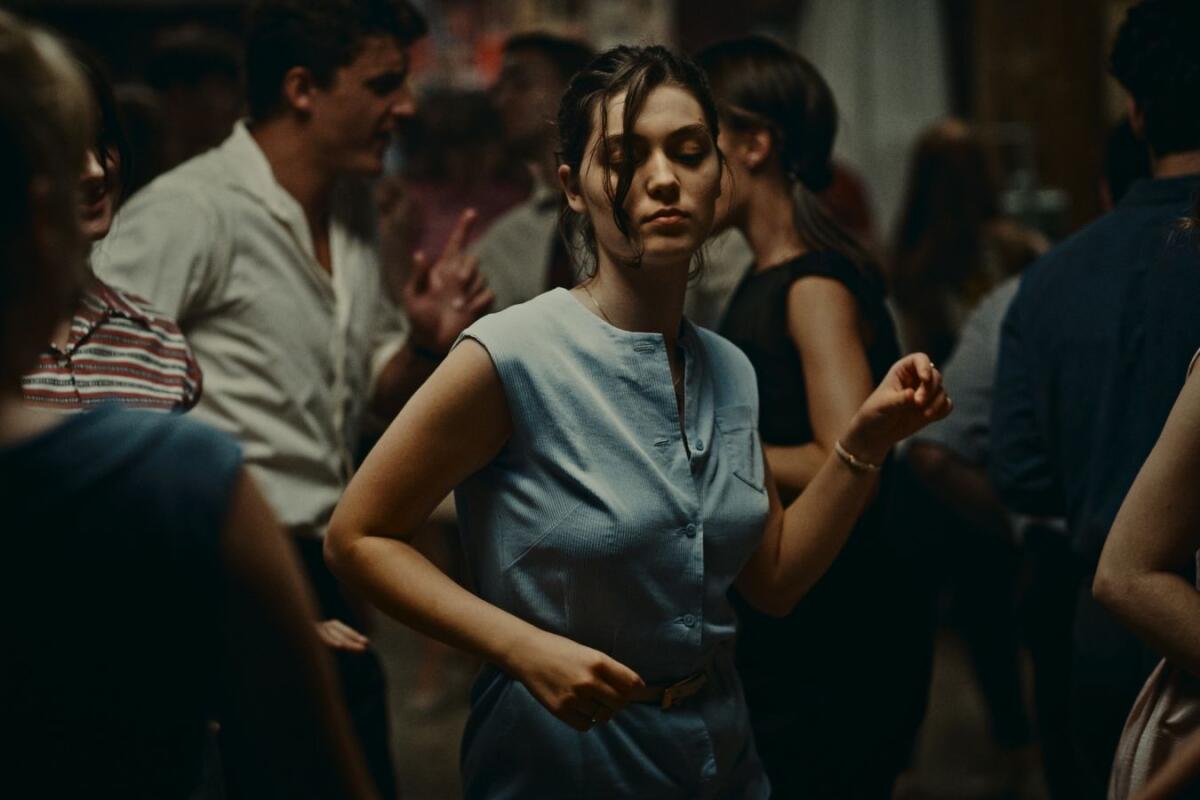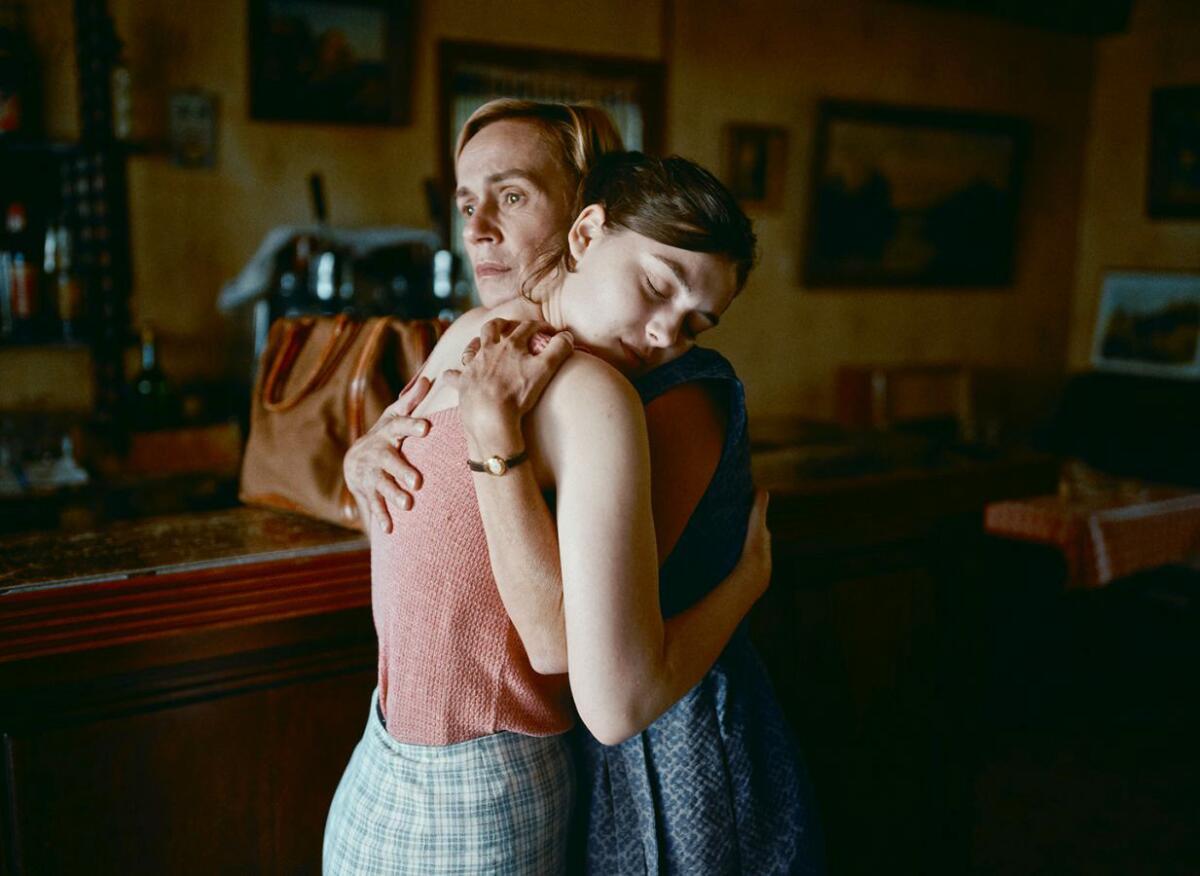Review: The tense French abortion drama ‘Happening’ is the movie you need to see right now

“I’ll manage.” We hear those words a lot from Anne (Anamaria Vartolomei), the quietly determined 23-year-old who grounds every scene of the tense, harrowing French drama “Happening.” She’s used to taking care of herself, whether she’s in a literature class, where she dissects a poem with ease, or on a crowded dance floor, where she attracts and deflects a lot of male attention. It’s telling that the director, Audrey Diwan, often films Anne from behind, her dark brown hair tied back in a ponytail that bobs slightly as the camera tracks her down a sunlit street or a dim hallway. Anne always seems to know where she’s going, even when the unthinkable happens and her life and her body begin to feel like bewilderingly alien territory.
“Happening,” winner of the Golden Lion at last fall’s Venice International Film Festival, follows Anne over a period of several weeks as she seeks to terminate a pregnancy. Since the story is set in 1963, when abortion was still illegal in France, her ordeal unfolds under a miserable cloud of shame and secrecy. The movie, adapted by Diwan and Marcia Romano from Annie Ernaux’s sharply observed 2000 memoir, unfolds in the southwestern town of Angoulême, where Anne is a top university student. But it also returns us to a more broadly recognizable era when doctors couldn’t perform abortions openly for fear of losing their licenses or worse, and when even the mere act of helping a woman procure an abortion could land a person in prison.
For your safety
The Times is committed to reviewing theatrical film releases during the COVID-19 pandemic. Because moviegoing carries risks during this time, we remind readers to follow health and safety guidelines as outlined by the CDC and local health officials.
And as the events of this past week in the U.S. have reminded us, that era, seemingly locked away in the past, may well be the future that awaits us. Diwan, deploying the period details with a subtle hand, immerses us in a vision of the early ’60s that, minus a few plaid skirts and pay phones, might just about pass for the present day. To call this movie timely would be both an understatement and a bit of a misnomer, since the battle for women’s bodily autonomy has never not been a timely issue. It might be more fitting to praise “Happening” for its urgency, not just because it arrives in American theaters under particularly fraught circumstances, but also because of the gut-clutching suspense and the wrenching intimacy that the director brings to the telling.
Diwan keeps us close to Anne at every moment but resists the urge to spell out what she might be thinking or feeling in any moment. Anne is quiet and unassuming, especially compared with her gossipy classmates, and “Happening” to some degree shares her discretion. It comes as a bit of a surprise — to the audience, as well as to Anne — when she learns that she’s pregnant, the result of an off-screen fling with a young man from a neighboring town. And Anne scarcely needs to articulate the limited options facing a working-class woman in her position — dropping out of school, getting married — to make clear that she intends to pursue a different strategy.

The aforementioned young man is of no help, and neither are the two male doctors she consults: The first is sympathetic, while the second practically throws her out of his office. Anne keeps the pregnancy from her parents (the great Sandrine Bonnaire plays her stern, loving mother), and the few female classmates she confides in give her the cold shoulder, partly out of fear of being implicated if she has the abortion. But it also stems from an atmosphere of sexual judgment as prurient as it is puritanical, as evidenced by a squirmingly uncomfortable scene of harassment in a dorm shower. In this moment and others, “Happening” proves especially perceptive about the carnal attitudes and anxieties of an era not quite on the cusp of a sexual revolution, five years ahead of the cultural and political youth-quakes of May 1968 (and 12 years before the French legalization of abortion in 1975).
Whatever it may illuminate about the past or the future, “Happening” confines itself to a swift, suspenseful present tense. As Anne’s body begins to betray her and her academics and relationships suffer, the movie becomes a clock-ticking thriller, with chapter markers indicating the passage of another week of her pregnancy. Géraldine Mangenot’s taut editing and Laurent Tangy’s fluid handheld camerawork generate an air of relentless, naturalistic tension that kicks up several notches once Anne takes matters into her own hands — first by attempting the abortion herself, and then by turning to the black market. Graphic, unsparing but never exploitative, “Happening” doesn’t flinch from the bodily horrors of a painful, invasive and sometimes agonizingly attenuated procedure. Neither does it let us forget the perils of having to perform and endure it in secret.
But not necessarily alone, as Anne gradually and gratifyingly discovers. She’s accustomed to self-sufficiency, and Vartolomei, her piercing blue eyes telegraphing wariness, alarm, frustration and resolution, shows us a woman used to processing a problem and its solution in the same moment. And so it’s unexpectedly moving when gestures of compassion and grace come to Anne precisely when she needs them: in a heart-to-heart conversation with a friend, or the no-nonsense ministrations of a stranger (the remarkable, gravel-voiced Anna Mouglalis). Like some of the best dramas about abortion rights to emerge in the past several years, including “4 Months, 3 Weeks and 2 Days” and “Never Rarely Sometimes Always,” “Happening” is a realist thriller that morphs, sans sentimentality or platitudes, into a quietly affecting portrait of female solidarity. That’s lofty company for a movie to find itself in. But it manages.
‘Happening’
(In French with English subtitles)
Rating: R, for disturbing material/images, sexual content and graphic nudity
Running time: 1 hour, 39 minutes
Playing: Starts May 6 at AMC the Grove, Los Angeles, and the Landmark, West Los Angeles
More to Read
Only good movies
Get the Indie Focus newsletter, Mark Olsen's weekly guide to the world of cinema.
You may occasionally receive promotional content from the Los Angeles Times.











